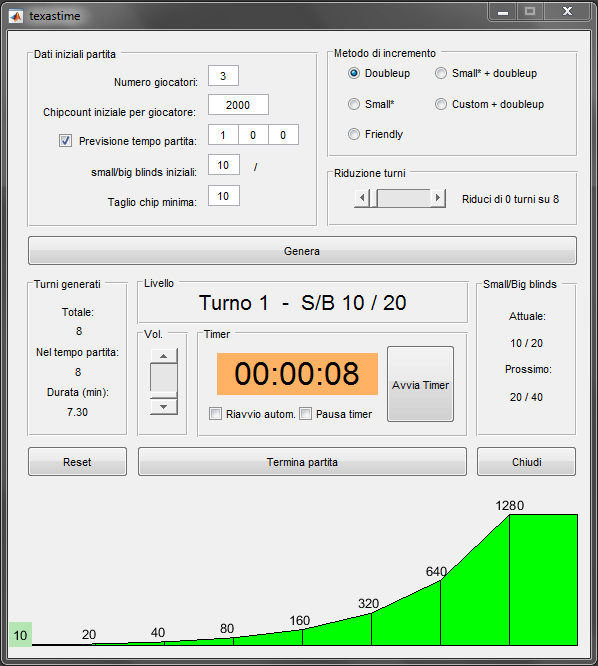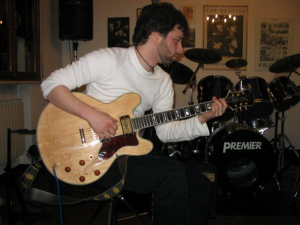Community Q&A: Massimo Zanetti
During the fall of 2016 MathWorks hosted a Scavenger Hunt and Triathlon to celebrate the 15th Anniversary of MATLAB Central. Massimo Zanetti was the winner of the Triathlon so we thought it would be interesting to learn more about him.
At the time of this interview Massimo Zanetti was a student pursuing his PhD at the University of Trento. He has since graduated. We would like to thank Massimo for agreeing to do this virtual interview. Also, be sure to check out his website here
Thank you! And I thank MATLAB Central for being there the last 15 years! I enjoyed playing in the two MATLAB Central events. It was funny and challenging at the same time. My favorite part in the Triathlon was surely the File Exchange competition. It has motivated me in sharing some of my code. I was already answering on the MATLAB forum and playing Cody before the Triathlon, but I started looking at exchanging code after this nice event. I hope I will improve this skill in the near future.
Everything started while pursuing my Bachelors Degree in a Numerical Analysis course. After having tried some other software, I figured out MATLAB had something the other software didn’t have: the matrix approach. It was one-to-one with linear algebra. I saw the light. But the potential of MATLAB was not only restricted to this. There were easy-to-use plotting functions, GUIs. The first impression I had was: “So, the dreams may come true”. The step from ideas to reality is shorter than ever.
My most lovely memory about MATLAB at the Numerical Analysis course, me and my classmate joined our efforts to better solve the problems proposed by the professor. At the end, we joined our lives too. :)
I don’t remember it precisely… it happened many years ago!
MATLAB Answers is very important for all MATLAB users. I try to do my best at answering questions. One important aspect of MATLAB Answers is that I can also learn a lot from the most experienced MATLAB Central contributors.
I am very interested in mathematical methods to image analysis. I got my Master’s in Applied Mathematics at the University of Ferrara, Italy. My thesis was on numerical implementation of variational models for image approximation. The topic covers very interesting theoretical arguments (e.g., free discontinuity problems, functions of bounded variation, geometric measure theory) and numerical arguments (e.g. non-convex optimization, descent methods, elliptic partial differential equations).
In trying to find collaborations for the applicative part of the thesis, I got in touch with a research group of the Civil, Environmental, and Mechanical Engineering Department at the University of Trento. They were interested in studying variational models applied to remote sensing data such as Digital Surface Models (DSMs) (gridded point clouds representing the 3D geometry of objects on the ground). We found out that variational models are very suited to process and extract useful information from DSMs of urban areas. From this collaboration, I discovered the remote sensing world.
Above our heads, there are many satellites observing us. The images that remote sensing provides us are very important for the monitoring and study of our planet’s evolution. Remote sensing images are not like the typical images we know. They are huge! There are many challenges to cope with in the analysis of remote sensing images, so I decided to go on with my studies by focusing on the remote sensing application. Currently, I am pursuing my PhD in the Remote Sensing Laboratory at the Information Engineering and Computer Science Department of the University of Trento. My research is mainly related to image analysis, in particular to the development of change detection methods for multispectral images and image segmentation. I am also involved in many projects at the National (Italian Ministry of Education, University and Research) and European (European Space Agency) level. After the PhD, the plan is to continue some studies in the remote sensing area as a Post-Doc. For the future, I am opened to many opportunities including being involved in MATLAB education initiatives.
Sometimes it happens that I fix code. For example, I like to show students how things can be efficiently implemented in MATLAB. Many of them implement code in a C/C++ fashion, so with many for loops, indices, etc. In MATLAB the approach is totally different. Code can be very compact by taking advantage of vectorization, logical indexing, matrix formulation. This is not a burden, it is a pleasure for me to share knowledge about MATLAB coding.
Here I would like to point out something: MATLAB is pervasive in Universities and this makes research easier in many ways. However, up to my knowledge, in a very few cases Universities propose MATLAB-based courses. I had the opportunity of learning MATLAB at professional level from two Professors at the University of Ferrara: prof. Valeria Ruggiero and prof. Gaetano Zanghirati. I would like to thank them for teaching us how to put problems into mathematics, and put mathematics into MATLAB.
Firstly, I would like to mention the code to numerically implement variational models to image approximation due to Mumford-Shah and Blake-Zisserman. I used this code for many purposes. I would like to mention one which is particularly interesting to me: restoring images of old paintings degraded by ageing effects such as the craquelure.
MATLAB also allowed me to do something for improving the quality of my spare time. There is one GUI I have developed (many years ago) to manage a Texas-Hold-Em match. It takes care of timing the game, raising up blinds, showing the graph of the game, etc. It has been a lot fun using it with my friends. The code is very old so I have never decided to put it on MATLAB Central. However, I will improve it and I will make it available very soon. Here is a picture of the Poker program window:
Another one I did was about darts. My girlfriend was given a classical dartboard, a non-electronic one. I developed a GUI to manage the game-play by counting the points of every player and implementing the rules of 501. MATLAB allows you to do everything!
I think all resources on MATLAB Central are equally important. The Answers forum is extremely important, not only for beginners but also for experienced users. For example, I came up to know about the new Implicit Expansion feature by reading an answer in the forum. Cody is a nice environment to improve coding skills. File Exchange allows one to share and improve code based on others suggestions and comments.
The will of sharing knowledge about this wonderful thing.
MATLAB jokes! Some of them are very funny! My favorite joke is by Chad Green
“Why did the inmate want to learn MATLAB?
-Just for cellfun.”
There are many more jokes located here on MATLAB Answers.
Playing music! I love playing any kind of music with my guitars and drums
Thanks to Massimo for taking the time to answer my questions.
- Category:
- Q & A













Comments
To leave a comment, please click here to sign in to your MathWorks Account or create a new one.